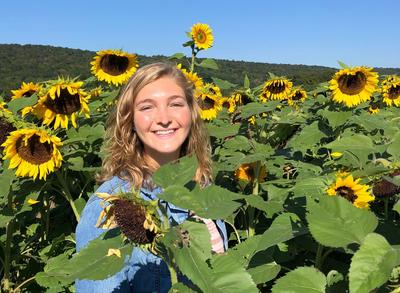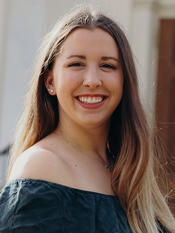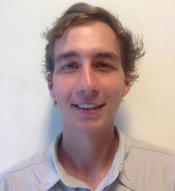By Kathryn Post ’22 M.Div.
A group of YDS students are adopting an imaginative Lenten practice by cutting back their contributions to fossil fuel emissions and repenting from the sin of creation destruction.
Gabe LePage ’22 M.Div. decided to go fossil free for Lent after noticing the despair around climate issues felt by students at YDS and Yale’s School of Forestry & Environmental Studies. He sees Fossil Free Lent, as it’s been dubbed, as “an invitation in the 40 days before Easter to walk with Jesus, to root what we’re doing in Jesus’ teachings, to practice loving one another in the face of despair, and think about what we can do together to live more fossil-free lives in ways we couldn’t do alone.”
 Natalie Benson ’22 M.Div. sees reducing her dependency on fossil fuels as an act of repentance. “In the Lutheran tradition, when we practice Lent we think a lot about human sinfulness and its impact on the world, and right now it’s really evident how human sinfulness is destroying our planet,” said Benson. “Repenting for that sinfulness in a very direct action reminds us that we aren’t so far removed from plants and animals, that we are so much more connected.”
Natalie Benson ’22 M.Div. sees reducing her dependency on fossil fuels as an act of repentance. “In the Lutheran tradition, when we practice Lent we think a lot about human sinfulness and its impact on the world, and right now it’s really evident how human sinfulness is destroying our planet,” said Benson. “Repenting for that sinfulness in a very direct action reminds us that we aren’t so far removed from plants and animals, that we are so much more connected.”
About 20 YDS students have committed to giving up fossil fuels in some capacity. In doing so, they’ve adopted five Lenten practices: gathering, prayer, fasting, almsgiving, and advocacy. The students meet every Monday evening around a bonfire at the Divinity Farm to support one another and build community.
Some students are fasting from their cars for Lent, while others are fasting from animal products or food waste. There are no hard-and-fast rules; students are encouraged to find innovative ways to limit their fossil fuel use. Among the practices they’ve devised: making worm bins for composting, purchasing food locally, or giving up online shopping (so as to avoid the impact of shipping). The goal isn’t self-improvement. Instead, it’s a communal effort to reflect on how fossil fuel use stands in the way of closeness to God and God’s creation.
 “Not driving your car for a few days might not have much of a carbon or environmental impact, but it can raise our own awareness about what is going on in the fossil fuel industry and our voluntary or involuntary involvement in it,” said Tori Crook ’22 M.Div..
“Not driving your car for a few days might not have much of a carbon or environmental impact, but it can raise our own awareness about what is going on in the fossil fuel industry and our voluntary or involuntary involvement in it,” said Tori Crook ’22 M.Div..
“I wanted to do something that would give me pause throughout the day, and since we eat multiple times a day, I’m going vegan,” said Benson. “I want to think about unity of creation in a new way, and the connectedness of all things. Hopefully going vegan will give me pause to (contemplate) where my food is coming from, what’s been given, and what I’ve sinfully taken from the planet.”
 In addition to fasting from fossil fuel dependence, students are donating monetary savings from their fasting efforts to a local justice movement. Students are not only hoping to support local environmental efforts with their funds, but also with their participation. Crook and Benson are both involved in New Haven justice efforts such as the local chapter of the Sunrise Movement, Fossil Free Yale, and other local efforts for equal access to clean water, clean air, and green space. By joining with these campaigns, those participating in Fossil Free Lent are hoping to promote fossil fuel reduction on an institutional and systemic level.
In addition to fasting from fossil fuel dependence, students are donating monetary savings from their fasting efforts to a local justice movement. Students are not only hoping to support local environmental efforts with their funds, but also with their participation. Crook and Benson are both involved in New Haven justice efforts such as the local chapter of the Sunrise Movement, Fossil Free Yale, and other local efforts for equal access to clean water, clean air, and green space. By joining with these campaigns, those participating in Fossil Free Lent are hoping to promote fossil fuel reduction on an institutional and systemic level.
One of the critical questions the Fossil Free Lent group has been asking is how to make the environmental movement more welcoming to diverse voices. “We shouldn’t be doing climate justice if the folks most affected aren’t there, or feel like they can’t be there and can’t be heard,” Benson said. “It’s not responsible or effective to do this work without them.”
LePage said that anyone is welcome to join in any part of the groups’ efforts, including their Monday night meetings around the bonfire.
The darkness around the light of the fire, Benson notes, seems like an appropriate place to linger during Lent. “We’re contemplating the darkness of sin and what we’ve been doing to the planet,” she said, “but also the light of community, how we can gather and how there’s some hope in that.”
Kathryn Post ‘22 M.Div. is a religion writer who focuses on the intersection of faith and social justice. Her work is also found in Sojourners, In All Things, and Broadview Magazine.